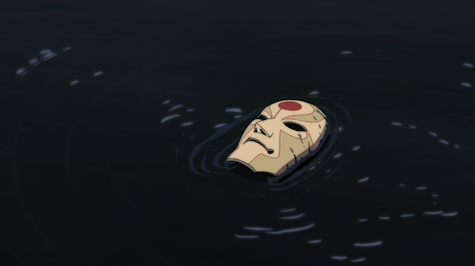Well, now that the hour long season finale of The Legend of Korra—consisting of the episodes “Skeletons in the Closet” and “Endgame”—have aired I have to admit that I was wrong. I don’t think it counts as spoilers to say as much; the theory I articulated after watching “The Revelation” was complete bunk, and I freely and gladly acknowledge that many other viewers had the right idea. I will happily eat crow, and have gotten my just desserts, so on and so forth.
According to Korra, the events of this season took place over a “few months,” which means that they’ve been keeping pace between the fictional world and ours. A pretty eventful couple of months, I’d say! I’m going to deal with each episode separately, and since this is the finale and it does answer a lot of the questions, subplots and mysteries of this season, consider everything that follows to be a big fat spoiler.
Right off the bat, seeing the giant Aang statue defaced (literally) with an Amon mask is eerie, especially after the site’s significance in “The Voice in the Night.” It has become perhaps the most defining part of Republic City’s skyline, and seeing it held by the Equalists really drives home the idea that they have control of the city. After the coup in “Turning the Tides” I asked where the populist uprising we were promised was, and we see it here in rallies in the park and in the repurposed probending arena that the Equalists destroyed during “ And the Winner Is.” Korra and Mako have infiltrated a demonstration using chi-blocker disguises, much the same way they snuck into the first secret meeting by concealing their identities. The Krew has been hiding out with the homeless fellow from “Welcome to Republic City,” who appears to live in an integrated underground shantytown. The group sits and hides, stewing in impatience and romantic tension*, while Amon, Hiroshi Sato and the Equalists occupy the city.

“Then, everything changed when the Fire Nation attacked!” Oh alright, it is the United Forces, but I’m sorry, you can’t put a guy named Iroh with Dante Basco’s voice on a warship and not make me think of the iconic opening from Avatar: The Last Airbender. General Iroh may have a mess of warships and trained benders, but The Equalists have Hiroshi Sato, the mad genius of Future Industries. Sato was just getting started with the mechs in “The Aftermath.” Mines are the first surprise, devastating the United Force’s navy, followed up by “high speed aircraft”: bi-planes, complete with self-propelled torpedoes and explosive bombs. The one-two punch is enough to knock the United Forces out, even with Korra doing a bang-up job clipping mines, redirecting torpedos and acting as a makeshift anti-aircraft gun.
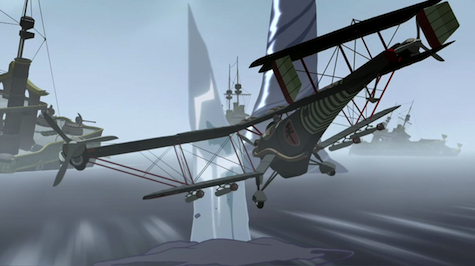
How old is General Iroh? He seems much younger here, where we see him in action; maybe he’ll be added to the roster of characters next season? It does seem like he is not related to Bumi; so much for that theory. The collar appears to be a military uniform, and Commander Bumi is the head of the second wave of the United Forces fleet. After regrouping and licking their wounds, our heroes part ways from one another. Korra feels the time is right to face Amon, and Mako goes with her, while Iroh, Bolin and Asami take Naga and go try to neutralize the airplanes. The romantic triangle started in “The Spirit of Competition” is nearing a breaking point. Mako and Asami part ways saying they “care” about each other. Alright, so it isn’t a breakup, but let me tell you what; if you go off on a life or death mission and the best you can muster up is that you “care” about your significant other? Not a good sign.
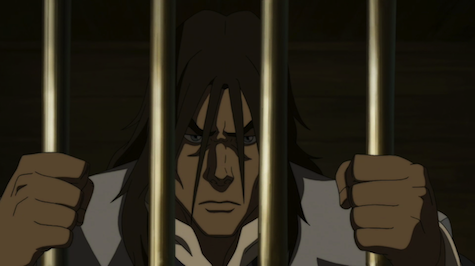
Then we get to the meat of the episode: Korra and Mako find Tarrlok under lock and key in the attic of Air Temple Island—where Amon has been holding court—and they find out the secret history of Amon: that Amon is Tarrlok’s brother, Noatak, son of Yakone, and a bloodbender. Boom. I guess the visions of Aang and the rest of the characters from the last season—crystalized in “Out of the Past”—really were incredibly pertinent to Korra’s troubles. Yakone got plastic surgery—as any good crime lord on the lam would—and high-tailed it to the Northern Water Tribe, where he married & taught his sons his signature style of “psychic bloodbending.” Sounds very similar to Combustion Man’s style, but I digress. Noatak and Tarrlok’s story is an all too plausible story of abuse, but it still isn’t enough to make Tarrlok sympathetic. It would take some kind of grand gesture for that
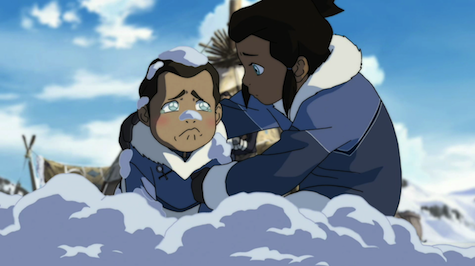
So that is the mystery of Amon, and the solution to the various odd abilities he possesses. I guess my theories about face-stealers and moon goddesses might seem a little fanciful, in retrospect. Everybody who guessed the bloodbending connection for both Amon & Tarrlock after “When Extremes Meet” wins the prize. It certainly fits; other people had prophesied that Amon would be a bloodbender and even been specific in saying that Amon and Tarrlok were both the sons of Yakone. He is able to avoid everyone’s attacks because he just barely tilts their blows awry, he was able to resist Tarrlok’s bloodbending because he’s a more powerful bloodbender and he’s able to take away people’s bending by well, that isn’t explicit, but like with Asami and Mako’s parting, sometimes you’ve got to read the implicit logic of a scene, especially with the fast, cinematic pacing of The Legend of Korra. Amon—Noatak—learned some way to use bloodbending to lock a chakra, much the same way that the pebble flung at Combustion Man’s forehead muddled his psychic firebending, or how Azula’s lightning locked Aang’s chakra.
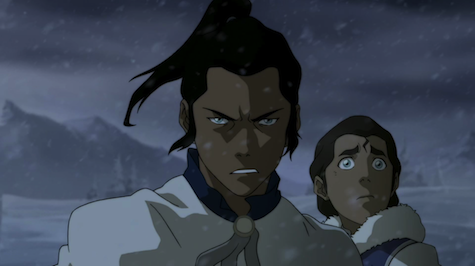
While I’m a little disappointed that Amon isn’t a true believer, a zealot for the cause of the Equalists, the motives he does have are a complicated and plausible bend. Tarrlok says that even as a child, Noatak cared about things being fair—which means that Amon at the very least has that crutch to lean on, internally, to rationalize his deception and assuage any self-doubt. He targets Republic City because like it or not his father Yakone’s quest for revenge was brainwashed into him, on some level. Then there is his clear statement that he views the ability to take bending away as the truest expression of power; trained from a young age to crave power as the only legitimately satisfying feeling, it is no wonder he searched out a way to do it himself.
How eerie is it to hear Aang’s voice coming out of Noatak? In the same way that General Iroh represents a fulfillment of Zuko’s redemptive character arc and the use of the same voice actor telegraphs that, using Zach Tyler Eisen paints Amon as an inverted savior, a negative image of the Avatar. And that is really chilling.
*Please note that Mordicai Knode avoided making a “romantic Tenzin” pun all season, even when there was the lingering romantic tension around Lin and Tenzin. He’s pretty proud of his self-restraint. He’s much less restrained over on Twitter and Tumblr, though.










